This past Tuesday, aside from a seven-game slate throughout the National Hockey League, the St. Louis Blues were in action. No, they didn’t find themselves on the ice, but in Washington D.C. Instead of visiting Alex Ovechkin and the Washington Capitals, they were visiting United States President Donald Trump and the White House.
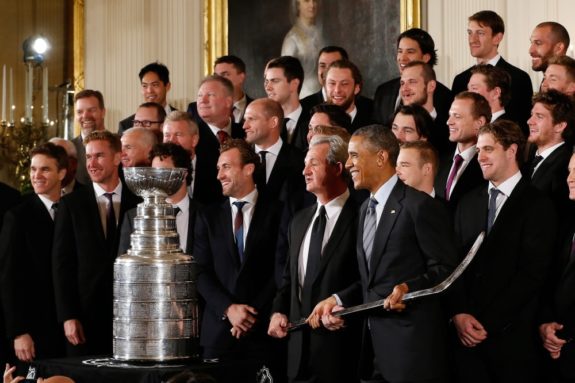
What was once a ceremony that barely caused a blip on the hockey radar has become an increasingly tactical event in today’s political culture. A visit to the White House was a customary tradition that many teams simply went through the motions of as part of their Stanley Cup championship celebrations without so much as an afterthought. Tuesday’s ceremony in the Rose Garden showed that White House victory visits are no longer back page of the sports section news.
The Tradition Behind It
In North American professional sports, it’s customary that the winner of their respective league would be invited to the White House to receive a congratulations from the sitting president. Thus, the World Series/Super Bowl/NBA Champion/NHL Champion/American Dodgeball Association of America champion or whatever would show up, take a few pictures, shake a few hands and be on their merry way. Oh, how times have changed.
The tradition of an annual White House visit with the Stanley Cup started with the late President George H.W. Bush in 1991 with the Pittsburgh Penguins. If the Stanley Cup champion was a Canadian team, the winner would make a customary trip to visit the Canadian Prime Minister instead.
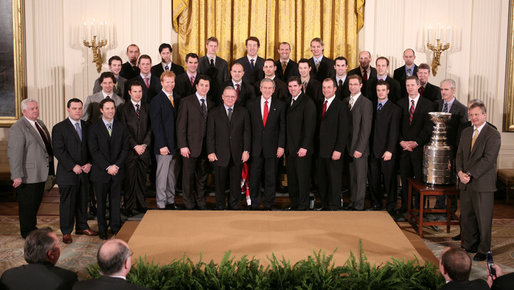
The tradition went on year in, year out with no drama until then-Boston Bruins goaltender and Conn Smythe winner Tim Thomas made headlines declining the visit in 2011. He stressed it was a personal, not political, statement, but the move generated controversy nonetheless.
How We Look at it Today
In the Trump Presidency, the White House visit has become a political litmus test for athletes and sports leagues alike. The Philadelphia Eagles and NBA Champions have made well publicized denials of the invitation, yet the NHL has continued the tradition with little push back. A few players may decide to sit out the visit, much like Braden Holtby last year when the Capitals made the short-distance visit, but largely the tradition continued.
Although some in the hockey world considered it controversial, Tuesday’s White House visit got lost in the headlines to the NBA’s ongoing drama with China and the MLB playoffs. Much like every other White House visit, there were photo opportunities galore, along with an inspirational, yet cookie-cutter sounding speech. The White House’s official tweet of the event is below:
Yes, Gary Bettman Was There
In addition to the Blues, inspirational superfan Laila Anderson was in attendance, as well as the commissioner everyone loves to hate, Gary Bettman. Bettman has been in attendance for the White House visit for years, solidifying the event as not only a celebration for the championship team, but recognition for the league as whole.
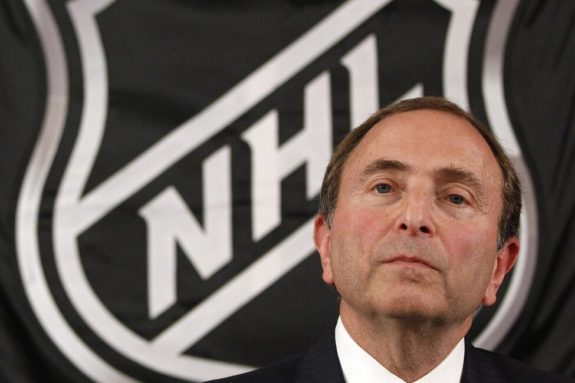
Cathal Kelly wrote a brilliant piece disseminating the controversy for the Daily Globe and Mail entitled “The St. Louis Blues aren’t visiting the White House for a political rally, it’s just a work trip.” (from ‘The St. Louis Blues aren’t visiting the White House for a political rally, it’s just a work trip,’ Globe and Mail, 10/14/2019) Not only did I find it fascinating (if any of you are interested, I highly recommend reading it in it’s entirety), but Kelly makes a rather bold assumption on the differences between the NBA and NHL, using the White House visit as his prime example:
This isn’t exactly a bold stand. It’s a business posture. The NBA has discovered that opposition to the sitting U.S. executive tends to burnish their standing with paying customers.
Also, Trump – unlike, say, China – isn’t showering the NBA with hundred-dollar bills from a leaf blower. Hence, the notable difference in tone when it comes to one strong man versus another.
Proponents of the White House visit claim that, regardless of personal politics, it’s a honor that should be accepted. When the issue of personal politics intertwining with sports came up, Bettman famously broke with his counterparts by advocating that players remain apolitical on the playing stage. At a 2017 panel with other fellow sports commissioners, Bettman perhaps summed it up best:
“People root for sports teams, follow sports, because it’s a communal activity. It may be one of the places where there is great unity within a community that transcends political divide.”
(Sports) may be one of the places where there is great unity within a community that transcends political divide,” he said.
How it Affects Players
Compare Bettman’s statement to the league behavior of the NBA where, for example, LeBron James inserted himself in the ongoing China drama for seemingly no good reason. You not only have the difference between the NHL and other league, but hockey players and other athletes in general. In general, NHL players are less outspoken and live lives largely outside of the spotlight on personal issues. A 2015 Boston Globe article examined why NHL Players are seemingly less likely to put their religion on display as opposed to other sports stars. (from ‘Religion Rarely on Display Across the NHL,’ Boston Globe, 04/05/2015) It’s possible that same attitude carries over to the equally sensitive topic of politics.
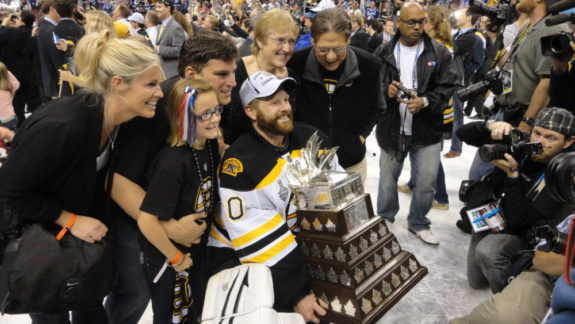
As we saw with the individual examples of Thomas and Holtby, the NHL and their respective teams do not force attendance. Neither athlete was punished for their decision, either. If the visit was classified a “team event” in the same category of practice, theoretically the team could hand down a punishment. Since the event is in some ways attached to politics, no NHL team would want to deal with that headache and possible backlash.
Back to Kelly’s article, he uses specific quotes from Blues players to demonstrate how they distance themselves from the sitting president. In short, they’re there to visit the white House, not President Donald Trump. Kelly makes no assumptions on if the specific quotes deal into Blues players’ personal politics, or their lack of interest in the matter. He does make a few assumptions about the politics of NHL owners, however. To the players, a White House visit would be a White House visit, regardless of who won the election. And for those who think it’s wrong for the Blues to be honored by a politician they don’t agree with, Kelly has a stark statement that all should take note of:
A sports team does not visit the White House (or any other house of government) for a political rally. They go there because it’s a work trip.
Physical proximity to power does not equal endorsement of it. Endorsement equals endorsement.
For what it’s worth, all returning members of the Blues team attended. Alex Steen attributed the seemingly perfect attendance, also at the Hockey Hall of Fame ring donation, as a testament to the closeness of the team. A few members who’ve moved on since the cup championship, such as Patrick Maroon who’s now with the Tampa Bay Lightning, were not in attendance.
The Flip Side
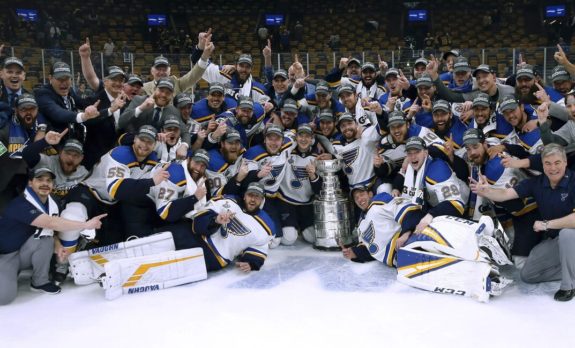
Interestingly, we’ve had little chance to see how the alternative would play out. Since only one Canadian team has won the Stanley Cup since the White House tradition firmly took hold, the Montreal Canadians in 1993, it’s been a while since the Prime Minister of Canada was paid a visit by hockey’s Holy Grail. Until a north-of-the-border team breaks the Great North’s drought, we won’t know if a visit to Justin Trudeau’s office will be as politicized.